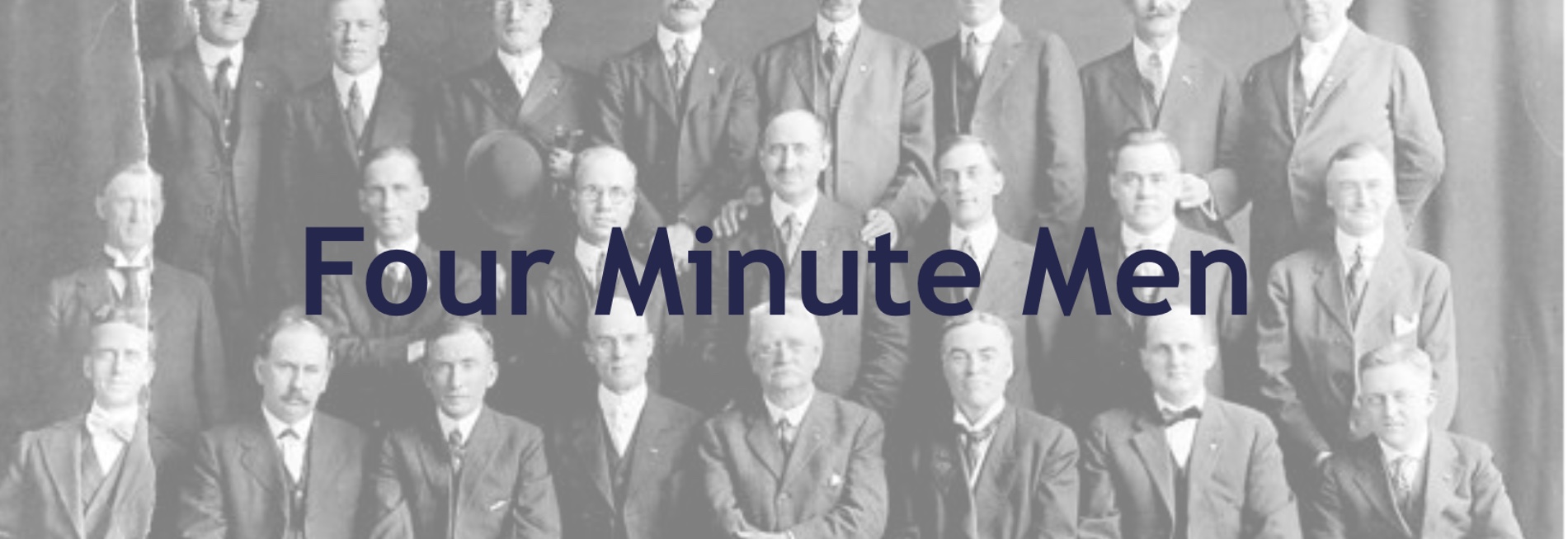
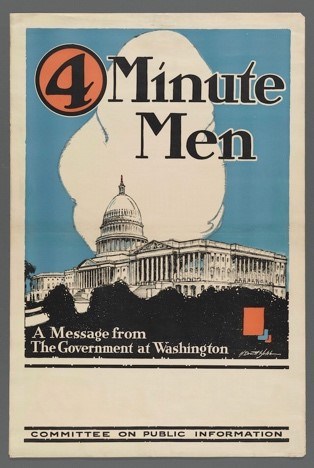
“4 Minute Men, A Message from The Government at Washington.” Library of Congress, 1917.
"Remember, this is not a war; it is the war. The task is to make the world free... It is the question of the survival of autocracy or democracy. They are in their death grapple. It is a fight to the finish and it is up to us."
~ Rabbi Stephen Samuel Wise, Four Minute Man, “What are we fighting for?” (1918) [2]
A CPI division called the Four Minute Men coordinated a massive public speaking campaign, recruiting 75,000 volunteers who gave 7,500,000 propaganda speeches to 130,000,000 people all over the country. These community leaders and celebrities essentially served as a national broadcast system communicating Wilson’s message.
"During this time, there was a common joke that when more than six people gathered together it would be a rare thing if a Four Minute Man did not arrive to inform them that they needed to buy war bonds, save food and fuel, and support the actions of the government...The speeches were not done entirely in English, but were instead spoken in a variety of languages such as: Italian, Polish, Lithuanian, Magyar-Hungarian, Russian, Ukrainian, Armenian, Bohemian-Slovak, and Yiddish."
- Chloe Maxwell, "George Creel and the Committee on Public Information 1917-1918" [1]
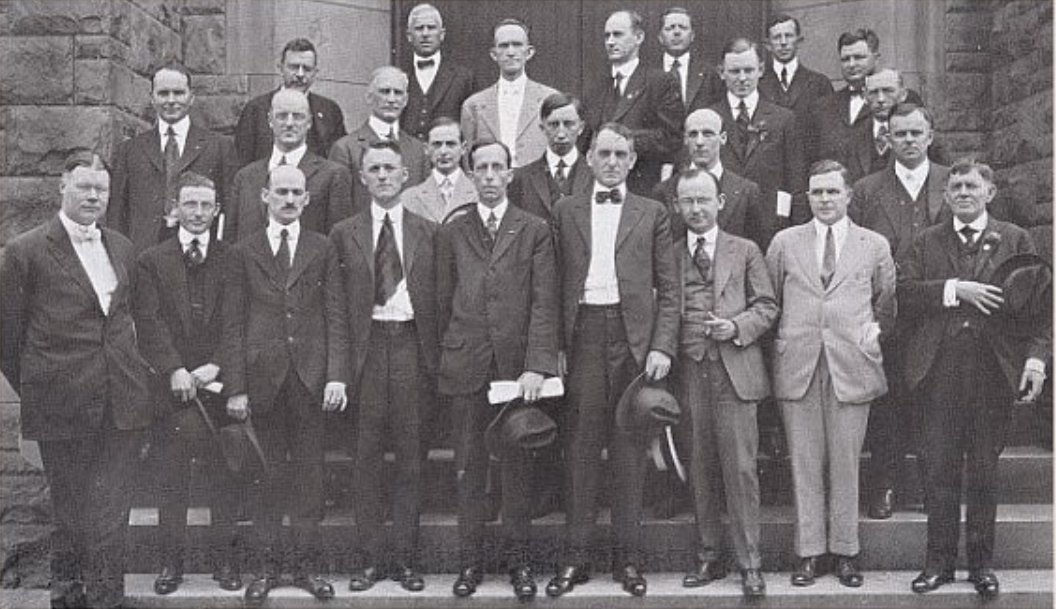
"The Honorable Four Minute Men of Knox County, Tennessee." Library of Congress, ca. 1917-1918.
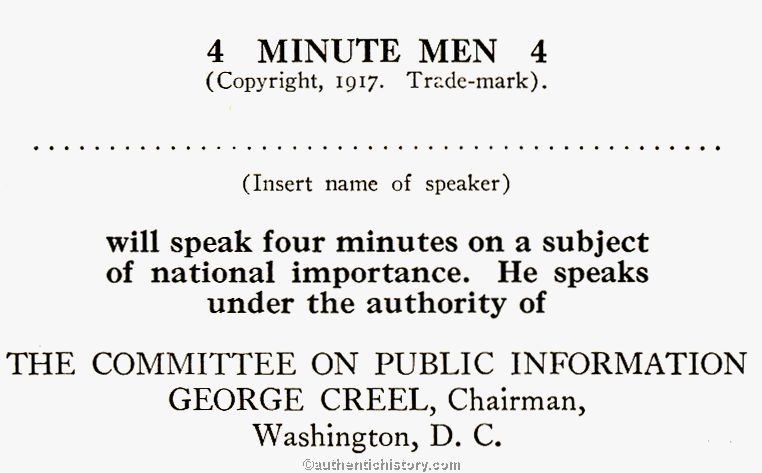
"Third Liberty Loan.” Library of Congress, 1918. [3]
“Glass Slide Projected at Movie Theaters.” History on the Net, 1917-1918.
"How can we reach [the people]? Not through the press, for they do not read; not through patriotic rallies, for they do not come. Every night eight to ten million people of all classes, all degrees of intelligence, black and white, young and old, rich and poor, meet in the moving picture houses of this country, and among them are many of these silent ones who do not read or attend meetings but who must be reached."
~ Bertram Nelson, Associate Director of the Four Minute Men Division (1917) [4]
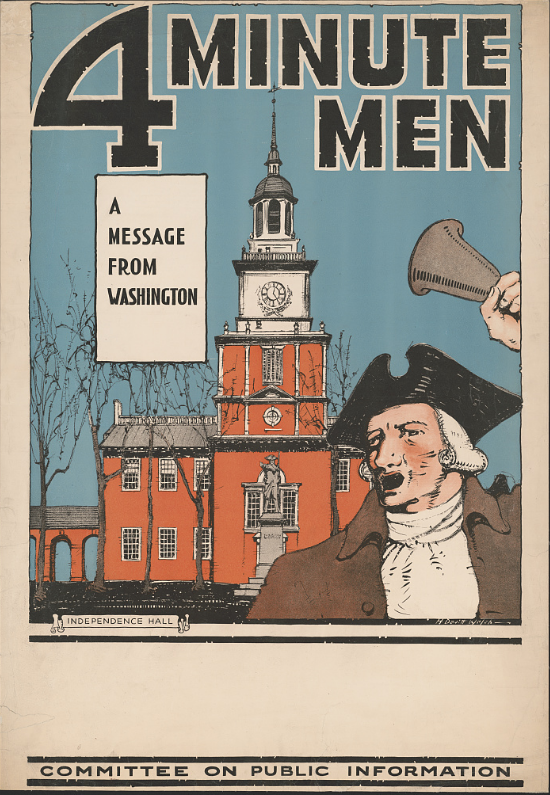
Walsh, H. Devitt. Committee on Public Information. “4 Minute Men, a message from the government at Washington.” Library of Congress, 1917.
They were called Four Minute Men after the American Revolution militia, and because their first speeches were given in movie theaters during the four-minute break to change the film reel.
Creel wanted speeches to be positive and patriotic: "NO HYMN of hate accompanies our message. This is a war for ideals, and in marching toward victory we must not trample on The Ideal. As Government representatives, we Four Minute Men must never forget our mission, not to arouse hatred, not to inflame passion, but to show facts, to inspire deeper convictions..."
- Four Minute Men News Edition A (1917) [5]
However, speakers sometimes went off-message, focusing heavily on guilt, fear, and anti-German hate speech: "We must keep those goose-stepping, baby killing educated gorillas away from our shores…There are only two classes of people on earth to- day—human beings and Germans—and we are going to keep America as it now is, a place for human beings."
- Four Minute Men News Edition D (1918) [6]
Header image: "4 Minute Men." Medium France, 15 May 2015.
[1] Maxwell, Chloe. “George Creel and the Committee on Public Information 1917-1918.” Tenor of Our Times, vol. 4, article 8, Spring 2015.
[2] Wise, Stephen Samuel. “What are we fighting for?” Library of Congress, New York: Nation’s Forum, 1918.
[3] Multimedia visuals: “Charlie Chaplin Addressing Crowd.” Getty Images, 1917; “Charlie Chaplin Making His First Speech for the Third Liberty Loan.” National Archives at College Park, 4 Apr. 1918; “Charlie Chaplin Speaking At War Rally.” Bettmann, 1917; ”Four Minute Men Chorus." Library of Congress, 1918; “Hello—This is liberty speaking - billions of dollars are needed and needed now.” Library of Congress, 1918; “How WWI Changed America: Selling the War.” National WWI Museum and Memorial, 5 Aug. 2020; “Propaganda.” American History Rules, 3 Mar. 2009; “Why Germany Wants Peace.” Library of Congress, 1918.
[4] Conolly-Smith, Peter. Translating America: An Ethnic Press and Popular Culture, 1890-1920. Smithsonian Books: Washington, DC, 6 July 2010.
[5] Committee on Public Information. Four Minute News Edition A. University of Colorado at Boulder Libraries. Archives Dept., 1917.
[6] Committee on Public Information. Four Minute News Edition D, Yumpu Publishing, 29 June 1918.